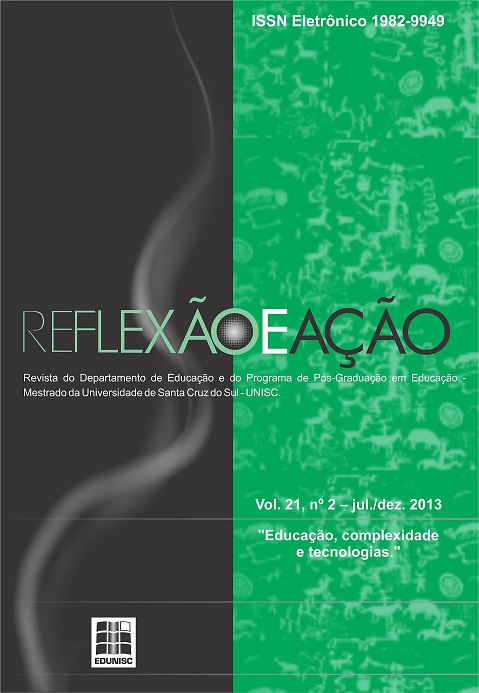THE CONSTRUCTION OF A RESEARCH PROJECT IN A COMPLEXITY PERSPECTIVE
DOI:
https://doi.org/10.17058/rea.v21i2.4002Keywords:
Complexity, Autopoiesis, Ontoepistemogênese, Cybernetics IIAbstract
This article proposes the term ontoepistemogênese to designate the process of complexification of a subject, which, when coupled with its environment, becomes integrated with repercussions in all dimensions of the human being. The process of ontoepistemogênese in an autopoietic perspective, forced us to think in terms of self-construction as inseparable from processes and overlapping continuous vital flow of being, both in relation to internal and external processes. In this sense, the process for handling research data in the Project GAIA seeks always to address autopoietic cognitive/affective operations in each member of the group. Thus, humans build their inventive process of ontoepistemogênese in response to external disturbances and through a power, which is a result of the connections and belonging to the networks. To carry out such a task we searched mainly to the guidelines that are setting the paradigm of complexity, as has been expressed mainly by Edgar Morin (Morin, 1991) and Clara da Costa Oliveira, (1999, 2004, 2005). In addition, among other researchers in the same field, we used Humberto Maturana and Francisco Varela to construct a set of operative elements, which led us to the understanding of life, by bringing the principle of self-organization and, more specifically, the concept of autopoiesis to understand this dense web of relations that constitute the living system.Downloads
Downloads
Published
How to Cite
Issue
Section
License
The submission of originals to this journal implies on the transference, by the author(s), of the printed and digital publishing rights. The author´s rights to the published articles are the author´s, the journal has the rights over the first publication. The author(s) can only use the same results in other publications, indicating clearly that this journal was the original publisher. Since we are an open access journal, the free use of articles is permitted for educational and scientific applications, as long as they inform the source according with the CC-BY license from Creative Commons.


